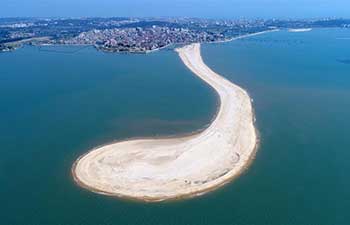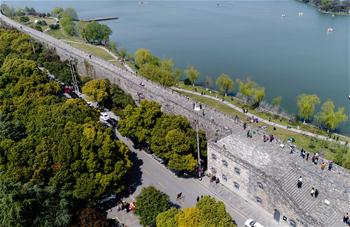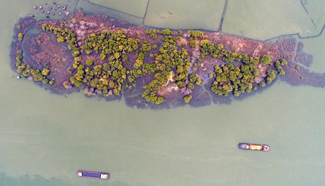LONDON, April 3 (Xinhua) -- A process that could help millions of people by turning sea water into drinking water was announced Monday by scientists in Manchester.
The wonder material, graphene, is at the heart of the new process. Scientists at the university have developed graphene-based membranes capable of sieving common salts.
Their new research demonstrated the real-world potential of providing clean drinking water for millions of people who struggle to access adequate clean water sources.
The new findings at the University of Manchester were published Monday in the journal Nature Nanotechnology.
A spokesman at the university said: "By 2025 the United Nations (UN) expects that 14 percent of the world's population will encounter water scarcity.
"This technology has the potential to revolutionise water filtration across the world, in particular in countries which cannot afford large scale desalination plants.
"It is hoped that graphene-oxide membrane systems can be built on smaller scales making this technology accessible to countries which may not have the financial infrastructure to fund large plants without compromising the yield of fresh water produced."
Graphene-oxide membranes developed at the National Graphene Institute in Manchester have already demonstrated the potential of filtering out small nanoparticles, organic molecules, and even large salts.
Until now, however, they couldn't be used for sieving common salts used in desalination technologies, which require even smaller sieves.
Previous research at the university found that if immersed in water, graphene-oxide membranes become slightly swollen and smaller salts flow through the membrane along with water, but larger ions or molecules are blocked.
The Manchester-based group has now further developed these graphene membranes and found a strategy to avoid the swelling of the membrane when being exposed to water.
The pore size in the membrane can be precisely controlled which can sieve common salts out of salty water and make it safe to drink.
The university spokesman added: "As the effects of climate change continue to reduce modern city's water supplies, wealthy modern countries are also investing in desalination technologies.
"When the common salts are dissolved in water, they always form a 'shell' of water molecules around the salts molecules. This allows the tiny capillaries of the graphene-oxide membranes to block the salt from flowing along with the water. Water molecules are able to pass through the membrane barrier and flow anomalously fast which is ideal for application of these membranes for desalination."
Professor Rahul Nair, at the University of Manchester said: "Realisation of scalable membranes with uniform pore size down to atomic scale is a significant step forward and will open new possibilities for improving the efficiency of desalination technology.
"This is the first clear-cut experiment in this regime. We also demonstrate that there are realistic possibilities to scale up the described approach and mass produce graphene-based membranes with required sieve sizes."
Jijo Abraham and Dr. Vasu Siddeswara Kalangi were the joint-lead authors on the research paper.
Abraham said: "The developed membranes are not only useful for desalination, the atomic scale tunability of the pore size also opens new opportunity to fabricate membranes with on-demand filtration capable of filtering out ions according to their sizes."


















